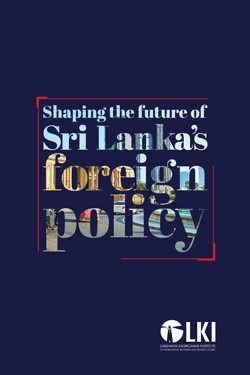The aftermath of Brexit has seen unprecedented global changes in its wake. We are yet to understand and adjust to the “new normal” of the international order, not to mention the “evolving normal” of Sri Lanka’s domestic order after the end of its civil war in 2009, and rebalancing of relations with major powers.
LKI’s latest publication, ‘Shaping the Future of Sri Lanka's Foreign Policy - Summary of Proceedings of LKI's Conference on Sri Lanka's Foreign Policy 2017’ presents proceedings from our landmark conference, ‘Sri Lanka’s Foreign Policy: Choices in a Changing World’ which convened a diverse range of local and international experts to understand the risks and potential of international and domestic orders and inform the direction of Sri Lanka’s foreign policy.

Reading Time: < 1 min read
In 2017, the Lakshman Kadirgamar Institute of International Relations and Strategic Studies (LKI) convened a landmark conference on foreign policy, to try and understand the risks and potential of international and domestic orders together – and to synthesise those understandings in a way that could inform the direction of Sri Lanka’s foreign policy. This was the primary objective of convening the conference, which was titled Sri Lanka’s Foreign Policy: Choices in a Changing World. The conference began with a seminar on Emerging Issues in the Indian Ocean and proceeded as a larger forum on Sri Lanka’s foreign policy, which explored (i) the foundations of that policy, (ii) its strategic, legal and economic issues, and (iii) its key actors.
The conference convened a range of experts – including officers from the Ministry of Foreign Affairs of Sri Lanka, other policymakers, academics and researchers from Sri Lanka and overseas, as well as lawyers, activists and journalists. Together, they provided analysis and suggestions on frameworks of Sri Lanka’s foreign policy (including non-alignment and Sri Lanka’s self-perception in international affairs), the day-to-day issues of Sri Lankan diplomacy (such as illegal fishing and finalising trade agreements) and strategies of foreign policy (for example, para-diplomacy and the use of international law). These proceedings present their views in summary and longer form, with the hope that it will help to formulate and refine policy ideas, responses and solutions, and provide the necessary detail to inform blueprints like Sri Lanka’s Vision 2025.